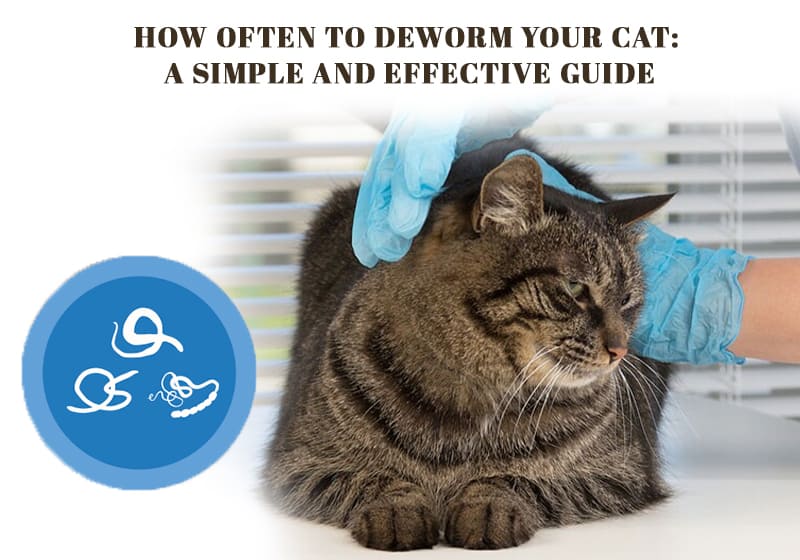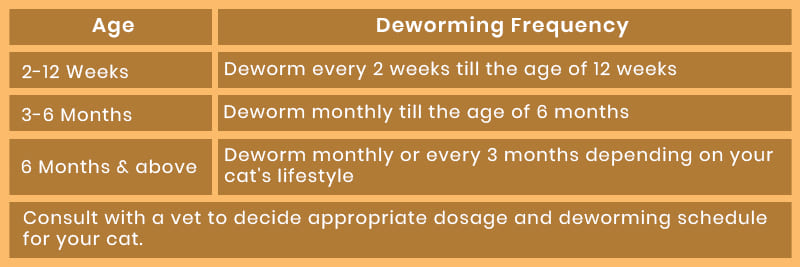
Internal parasites like roundworms, hookworms, and tapeworms are a common nuisance for kittens and cats. These parasites not only cause them discomfort and reduce their quality of life but also pose a significant threat to their health and overall well-being.
Deworming plays a vital role in treating these worm infestations and preventing their recurrence. But how often should you deworm your cat?
In this blog, we will solve this mystery for you. We will also discuss how you can choose the right deworming product for your cat.
How Often Should You Deworm Your Cat?
The deworming schedule for cats depends on various factors, such as their age, health, and lifestyle. For example, cats that hunt and prey outside are at a higher risk of getting worm infestations and thus require more frequent deworming compared to indoor cats. Additionally, kittens are more susceptible to contracting worms and thus require more frequent deworming as compared to adult cats.
Furthermore, you should follow a fixed deworming schedule for your kittens and cats to ensure they are protected throughout the year.
Deworming Schedule for Kittens and Cats
It is important to consult with your vet to create a deworming schedule for your kittens and cats. A vet can best advise and guide you on the appropriate deworming treatments and frequency based on your cat’s specific needs.
Generally, kittens are recommended to be dewormed every two weeks until the age of three months, and then monthly until they are six months old. Adult cats should be dewormed at least every three months, or more frequently if they have a knack for hunting or spend more time outside. By following a consistent deworming schedule, you can help protect your kittens and cats from the harmful effects of worm infestations and ensure their overall health and well-being.

Choosing an Appropriate Dewormer for Your Cat
The most important decision to make when deworming your cat is to choose the right treatment for your cat. There are enough types and brands of deworming treatments available on the market to put one in a dilemma. Before choosing any deworming product for your cat, it is important to have some basic understanding of the deworming products.
What Type of Dewormer is Best?
The best dewormer treatment type for your cats depends on their personal preferences and specific needs. As there are different types of dewormers with their advantages and disadvantages, it is important to compare your options before making a decision. Some common types of dewormers include oral medications and topical treatments.
Tablets:
- Given orally.
- Can be directly given or mixed with food.
- Flavored tablets are easy to administer.
Spot-On:
- Applied topically.
- Easy to apply.
Granules or Paste:
- Given orally.
- Preferred for mixing with food.
What are the Best Deworming Treatments for Cats?
There are numerous deworming treatments for cats available on the market; however, not all of them are equally effective. It is important to conduct thorough research before using any deworming treatment for your cat. Considering factors like the type of worm your cats have, their age, weight, and any underlying health issues they may have, you can find an appropriate dewormer for your cat.
The following are a few of the best-selling allwormers for cats on BestVetCare:
- Panacur Oral Suspension
- Profender
- Panacur Worming Granules for Cats
- Selehold
- Drontal Allwormer
- Triworm-C
- Droncit (Tapewormer)
Wrapping Up
Deworming is an essential part of keeping your cat healthy and free from parasites. Regular deworming can ensure that your cat is free from intestinal worms. Regular deworming can also help prevent the transmission of worms to other pets or humans in your household. It is recommended that you consult with your vet to determine the most effective and safe deworming schedule for your cat.
